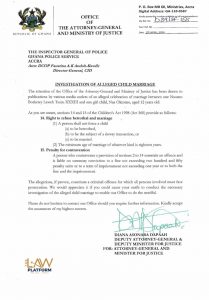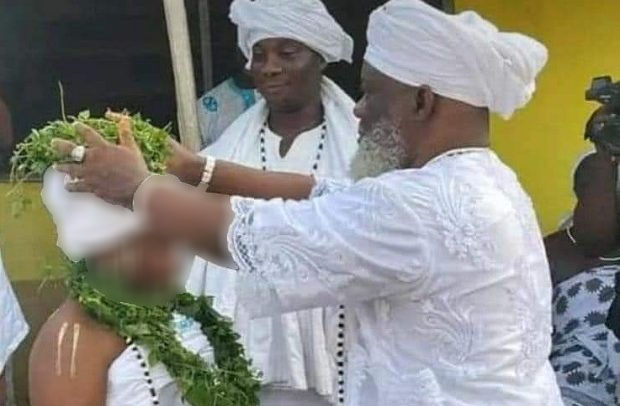The Office of the Attorney General and Ministry of Justice has taken a decisive stance in response to the controversial marriage between the Chief Priest, Nuumo Borketey Laweh Tsuru XXXIII, and a 12-year-old girl identified as Naa Okromo in Nungua.
The development surrounding this customary marriage has sparked widespread outrage and debates, prompting legal action against the Chief for alleged violations under the Children’s Act 1998 (Act 560).
In a letter issued by Diana Asonaba Dapaah on behalf of the Attorney General dated 2nd April 2024, indicated that sections 14 and 15 of the Children’s Act 1998 have been highlighted as the legal basis for potential prosecution against the Chief for his involvement in the marriage to Naa Okromo.
The Ga-Adangme Council’s acknowledgment of the marriage in an official Press Statement dated 1st April 2024 has further fueled calls for a thorough investigation into the events leading to the union.
The traditional marriage ceremony between Gborbu Wulomo, Nuumo Borketey Laweh Tsuru XXXIII, and ‘Naa Okromo,’ now named Naa Ayemoede according to customary practices, has underscored the complex interplay between age norms, cultural traditions, and legal mandates within the community of Nungua. While the marriage ceremony holds cultural significance, concerns have been raised regarding the protection and rights of minors involved in such unions.
Notably, the completion of the marriage awaits the performance of a crucial purification ritual by Naa Ayemoede, symbolizing her readiness for the marital responsibilities associated with being the spouse of Gborbu Wulomo, including the expectation of bearing children as per tradition. The selection of a ‘bue ekpaa yoo’ by the Gborbu Wulomo, serving as his customary wife, is a revered practice integral to his ceremonial duties and status within the community.
The contentious marriage has ignited a polarizing debate around the preservation of cultural practices and the safeguarding of minor’s rights in the face of legal frameworks.
The escalating controversy calls for a delicate balance between respecting age-old customs and upholding the welfare of vulnerable individuals, particularly minors.
This case serves as a poignant reminder of the need to navigate the delicate intersection of tradition, law, and human rights to ensure a harmonious coexistence between age-old customs and contemporary societal values.
As the legal process unfolds, the scrutiny on this customary union amplifies the imperative for informed discourse and meaningful engagement to address the complexities arising from cultural practices that intersect with legal protections for minors in Ghanaian communities.

By Vincent Kubi

